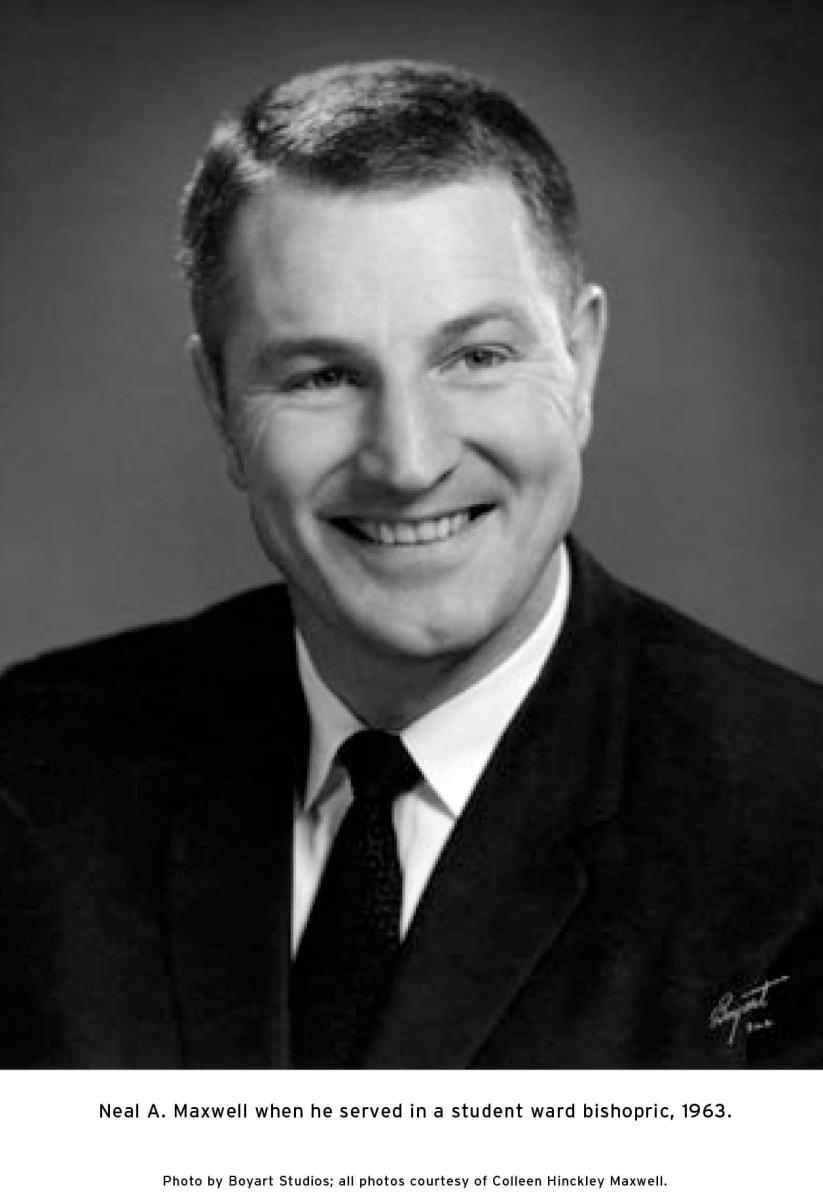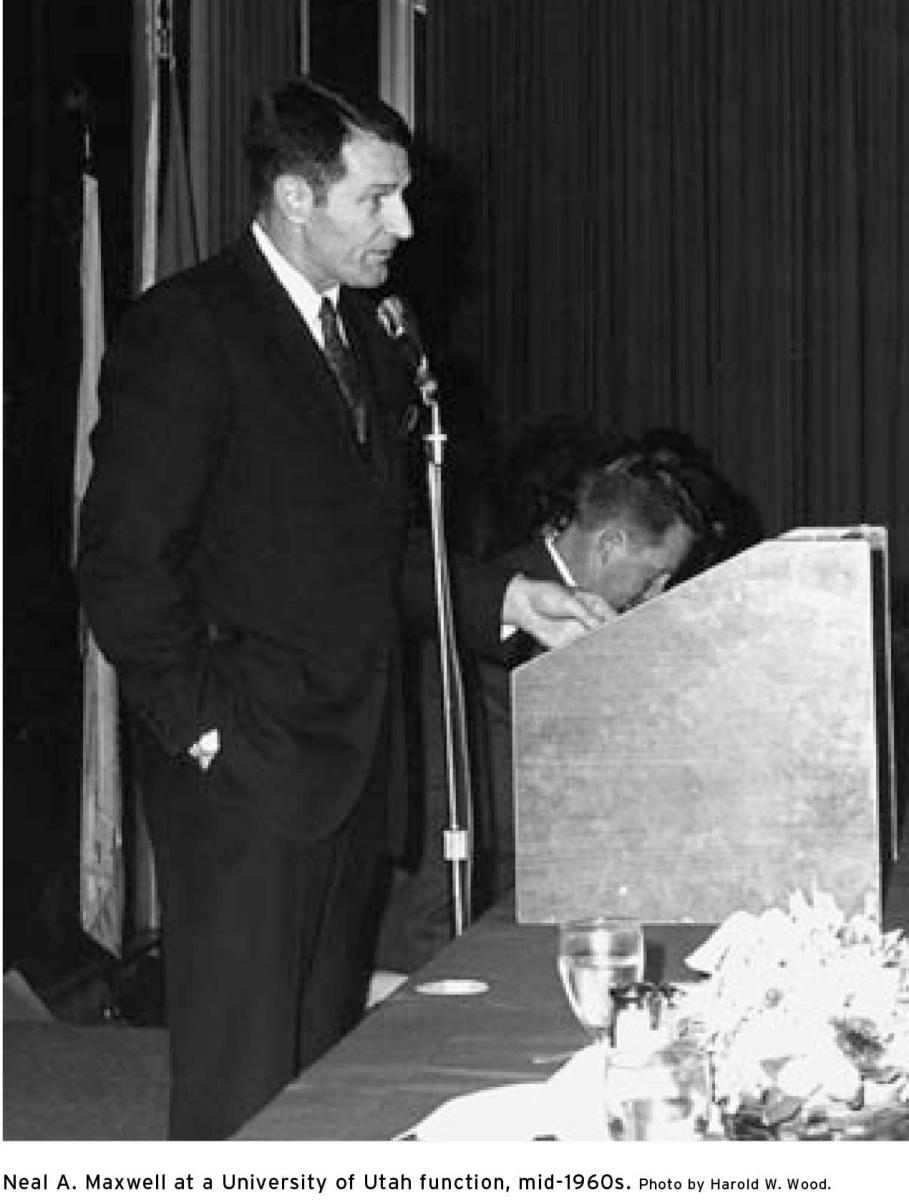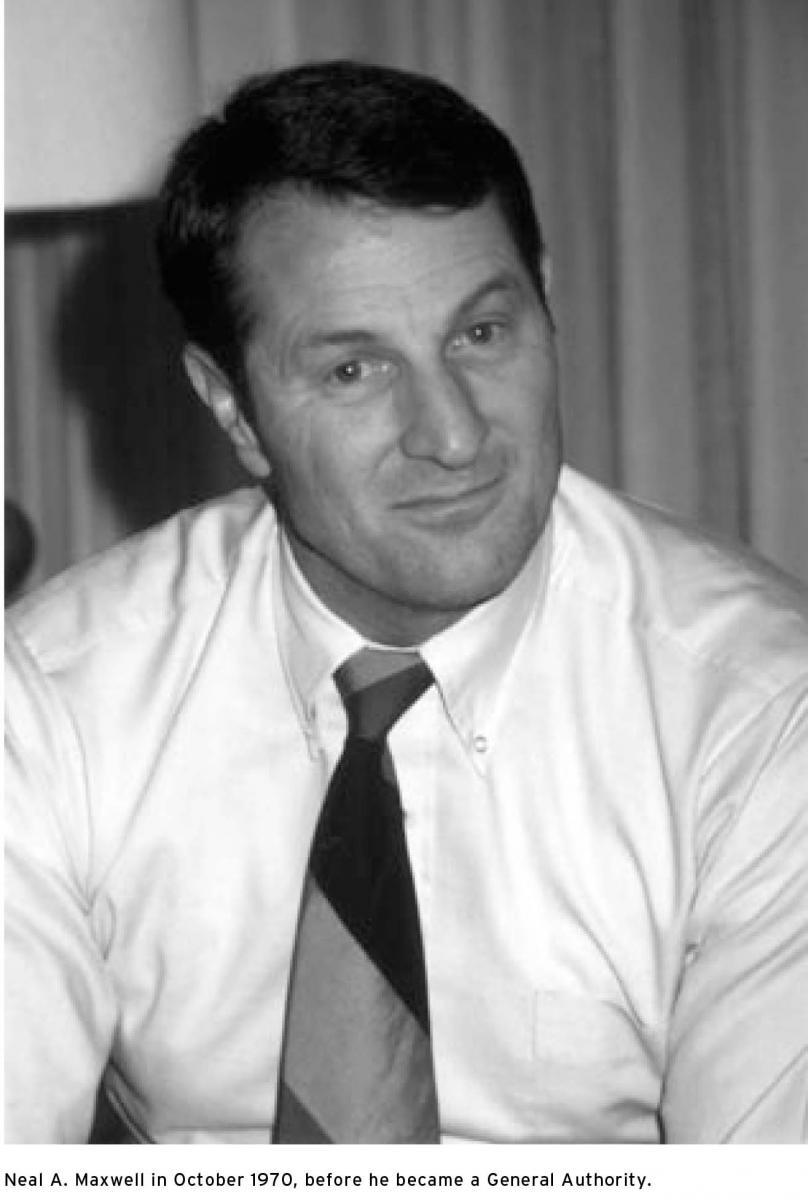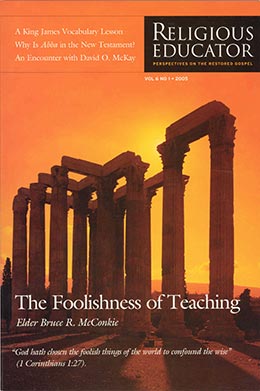My Recollections of Elder Neal A. Maxwell
Victor L. Walch
Victor L. Walch, “My Recollections of Elder Neal A. Maxwell,” Religious Educator 6, no. 1 (2005): 139–145.
Victor L. Walch, a former mission president, was a member of the Religious Educator Editorial Advisory Board when this was written.

On Thursday, September 4, 1958, I received a telephone call from the secretary of Elder Spencer W. Kimball of the Quorum of the Twelve Apostles. The message was that Elder Kimball was leaving Salt Lake City later that day on a Church assignment. I listened with some concern because he was scheduled to perform our marriage in the Salt Lake Temple the following day, September 5. The secretary said that if we still wanted Elder Kimball to perform the temple ceremony, we would have to come to the temple within the next hour or so. My fiancée, Carole, and I quickly agreed to the change and left for the temple. We had traveled to Salt Lake City the day before from northern California, where I was stationed at Fort Ord and Carole was living in San Jose.
September 5 proved to be the commencement of two new chapters in our lives. The first chapter, our marriage, was certainly the most significant. The second chapter was our acquaintance with Oscar and Judy McConkie, two stalwart members of the kingdom. And through the McConkies, we soon became friends with Neal and Colleen Maxwell.
Immediately after our marriage, we went to the home of Oscar and Judy McConkie for a wedding dinner hosted by them. We had not previously met them, but Judy’s mother and father had been very close friends to my parents for many years. During that dinner, Oscar discussed with us the recent creation of two campus wards at the University of Utah. Oscar also shared with us that he was then serving as the bishop of one of the campus wards, the University Fourth Ward of the University Stake. For the previous twenty months or so, I had served as group leader for Latter-day Saint soldiers at Fort Ord, California. Being a member of an organized ward was going to be something I had not done for close to four years—two years as a full-time missionary and approximately two years in the U.S. Army. At that dinner, Oscar described how the student wards operated. He also informed me that Neal A. Maxwell was his first counselor. This was the first time that I had heard of him, but within a few weeks my wife and I became aware of the special gifts and talents he brought to the bishopric of the University Fourth Ward. After our move to Salt Lake City, I was eventually called to serve as second counselor to Bishop McConkie. This calling placed me in a very close and personal relationship with two men I dearly love and admire, Oscar W. McConkie and Neal A. Maxwell.
The experiences that my wife and I shared with other members of the University Fourth Ward varied greatly. Some were extremely spiritual, remembrances of which are cherished to this day. These experiences have helped us better understand and appreciate gospel principles and Church organizational procedures. Other experiences might be described as social in nature. Lastly, some were quite humorous. Many of these funny experiences continue to evoke smiles and laughter as we remember them.
We relished the messages of faith and testimony that Bishop McConkie and Brother Maxwell shared at sacrament meetings, Sunday School, and priesthood and Relief Society meetings. As a ward family, we also made monthly trips to the Salt Lake Temple, where we participated in the sacred ordinances of the temple. Afterward, we met in the homes of our bishopric and the homes of other married couples in our ward. There we enjoyed a warm bowl of soup or a dessert and then listened to stories and experiences of faith, as well as doctrinal commentary, from both Bishop McConkie and Brother Maxwell. These many experiences we shared helped us become better husbands and wives and parents.
Spiritual Experiences
A particular spiritual experience occurred during this time. In the fall of 1959, a new campus stake was organized at the University of Utah. President Bill Kirton was called as the stake president, and Oscar McConkie was called as his first counselor. Neal was called as bishop of a new student ward. As we prepared for the first stake conference of this newly organized stake, we were informed that the general session of the conference on Sunday would be held in the Tabernacle. Our conference visitor was Elder Joseph Fielding Smith.
At the priesthood leadership meeting on Saturday afternoon, President Kirton informed us that the stake presidency had met with Elder Smith in preparation for the conference. During that meeting, members of the stake presidency had posed questions to Elder Smith as to meanings and interpretations of various scriptures and temple ordinances. President Kirton then stated that Elder Smith was uncomfortable in discussing such sacred matters outside the temple but that a special meeting would be held in the temple for all priesthood leaders in the stake. Elder Smith said that he would answer and respond to any questions asked by those in attendance. Of course, we were all in attendance at the special temple meeting, including the new bishop in the stake, Bishop Maxwell. We posed a great variety of questions and were more than edified during that special gathering. How do you describe such an event? I believe all of us in attendance received added appreciation of the Prophet’s description of the vision he received, along with Sidney Rigdon, as recorded in section 76 of the Doctrine and Covenants: “For they are only to be seen and understood by the power of the Holy Spirit” (v. 116).
Another experience we enjoyed in the campus ward related to both a doctrinal and a procedural aspect of the Church. This particular experience had a profound impact on many of us but may well have had the greatest impact on Elder Maxwell. On this occasion, Bishop Oscar McConkie shared with us the principles and doctrines associated with the giving of fathers’ blessings. The points he made in his presentation did not relate to the blessing that is given to an infant soon after birth. Instead, he focused on the importance of fathers’ blessing their children as they grew and became more mature. Bishop McConkie instructed us in the procedures associated with the giving of such blessings and the times or events when such blessings would be appropriate. Elder Maxwell had not been previously instructed in giving fathers’ blessings because his father was a convert, so he listened with great interest to that counsel.
Later, after Elder Maxwell was serving as a member of the Quorum of the Twelve, he attended a stake priesthood meeting where Oscar McConkie was in attendance. While speaking at this particular meeting, Neal referred to his previous associations with Bishop McConkie and to the many principles of Church government and Church policy he learned from him. Elder Maxwell then referred to the special message that Bishop McConkie had given concerning fathers’ blessings. Elder Maxwell then said that he had asked his own father a few times for such a blessing but that the requests were declined due to feelings of inadequacy. Elder Maxwell then related how, many years later and as a General Authority, he finally obtained the desired blessing from his father.
Social Events
As one might well imagine, young people attending a college and university find outlets for social contact. The same was true for those of us attending the University Fourth Ward. Much of our social contact included other ward members, as well as members of our bishopric. These social activities found us in the homes of the McConkies and the Maxwells on a variety of occasions. Their homes became extensions of the homes of campus ward married couples. There we not only socialized but we watched and observed Bishop McConkie and Brother Maxwell in their dealings with their spouses, Judy McConkie and Colleen Maxwell. We listened to how they spoke to each other. We watched how they demonstrated their love and respect for their companions. We observed how the gospel was truly the very foundation of their homes and families. That which we watched, heard and observed became the standards upon which we, as students, established our own homes, lives, and careers.

At one point while I was attending the University of Utah and serving in the bishopric, Brother Maxwell invited me to come to his university office. While there, he asked me if I would be willing to serve as master of ceremonies for some entertainment productions then being considered by the university. While I was stationed at Fort Ord, I had been a member of the Fort Ord Soldiers’ Chorus, one of the top-ranked vocal groups in the army. As a member of the chorus, I was asked by its director to serve as its master of ceremonies at its concerts. This invitation from Brother Maxwell proved to be a delightful and fulfilling experience, and I was both pleased and honored at the invitation. The experiences I had from that activity provided another special chapter in my life.
Humorous Experiences
I would like to share some humorous events that remain a significant part of our associations with the McConkies and the Maxwells. One must understand that both Oscar McConkie and Neal Maxwell had great appreciation for humor. They both enjoyed very quick and sharp minds. They also loved to laugh. Their personalities provided receptive ears to a good story or a humorous event.
One evening, Bishop McConkie, Brother Maxwell, and I were making visits to various ward members. We did this as a bishopric on a weekly basis. One of our visits made on this particular evening was to the apartment of a graduate student in philosophy at the University of Utah. This student was a little older than most of our student members. He was a teacher in the Aaronic Priesthood but was totally inactive. As we sat in his apartment, Neal asked him what had occurred in his life that led him away from the Church. The philosophy student responded, “I finally came to realize that Jesus really didn’t want me to be a Sunbeam.” The humorous response from the student has remained a choice remembrance of our service together as members of the University Fourth Ward bishopric.
At Sunday School one day (this was in the day when Sunday School was conducted during the morning hours on Sunday with sacrament meeting held later in the afternoon as a separate meeting), one of the students in the ward was conducting hymn practice. The congregation included over 130 ward members, many of them recently married and some of them with infant children, and Bishop McConkie, Brother Maxwell, and I were on the stand. The student music director was leading the congregation in singing the hymn “We Are Sowing.” We all sang together the words of the hymn “We are sowing, daily sowing countless seeds of good and ill.” We had no sooner finished singing those lyrics when the director cut us off abruptly. Speaking to the congregation, he said, “Singing this hymn reminds me of some news I want to share with you. My wife is expecting our first baby.”
A Man of Integrity
One additional experience that I had with Elder Maxwell may be of some interest. Few know the story. In Los Angeles, in the late 1960s, an extremely wealthy man passed away, leaving an estate valued in the hundreds of millions of dollars. Much of the estate was placed in a trust with three trustees. This trust provided that the money was to be used in the construction of buildings on university and college campuses. There were several conditions included in the trust agreement. One of the conditions that the decedent had included in the trust was that if any university or college asking the trustees for a grant from the trust was owned and operated by a religious organization or church, it had to be Protestant.
Serious consideration was being given by Ernest L. Wilkinson, then president of Brigham Young University, to make formal application for a grant from the trust. President Wilkinson called my senior partner, Adam Y. Bennion, and asked him to research the matter. I was asked to assist Adam in this undertaking. Months later, President Wilkinson concluded his tenure at BYU. As my partner and I discussed the issue that President Wilkinson had given to us, we reviewed the writings and speeches of various Church leaders where definitive comment had been made that the Church was neither Catholic nor Protestant. I expressed to Adam Bennion my concern that if an application was ever made to the trustees and if the application came to the attention of the general public, the Church could suffer great embarrassment over its perceived inconsistent positions about whether the Church was Protestant or non-Protestant. I also recommended to Adam that with the conclusion of Ernest Wilkinson’s service at BYU as university president, the First Presidency of the Church should be made aware of the situation. Adam asked me who we might call, and I suggested Neal Maxwell, then serving as the commissioner of education. (It is noteworthy that Adam’s father, Adam S. Bennion, had previously served as commissioner of education many years before.)
Adam asked me to make the call. I visited with Neal on the telephone and told him of the undertaking with which we had been involved regarding the trust and a possible application for a grant. He informed me that he would discuss the matter with the First Presidency and that someone would get back to me.
Within a week, I received a telephone call from Dallin H. Oaks, recently appointed as the president of BYU, succeeding Ernest L. Wilkinson. President Oaks asked us to arrange a meeting with the three trustees so that he might meet with them personally. This meeting was scheduled, and President Oaks met with the three trustees, Adam Bennion, and myself. President Oaks expressed his appreciation for the trustees’ willingness to meet with him and for their interest in BYU. He then indicated that while he appreciated the feelings of the trustees toward BYU, BYU would not make any application for a grant from the trust. In my judgment, Neal’s willingness to become involved in this matter saved the Church significant embarrassment had the application been formally submitted.
Qualities of the Heart

Over the years, I have often pondered as to the special qualities developed by Neal during his life. My glimpse into his life was not terribly long. The opportunities for me to learn from him were limited in time, but, given the time that I did share with Neal while I was attending the University of Utah, I have concluded that his strengths related to the heart. First, it was my observation that Neal had sufficient strength of his own identity that he would permit others to know his heart and his personal feelings. By opening his heart and feelings to others, he was able to assure them of his love, respect, and concern for them. Second, it was my observation that by opening his heart and soul to others, they, in turn, would invite Neal to better know and understand the feelings of their own hearts and souls. After all, these were the very characteristics expressed by the Lord to Thomas Marsh in D&C 112, where the Lord stated, “I know thy heart” (v. 11). I am a better man from knowing Neal A. Maxwell. But I am an even better man by permitting Neal A. Maxwell to know me.
